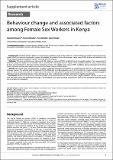Behaviour Change and Associated Factors Among Female Sex Workers in Kenya
View/
Publication Date
12/26/2012Type
Article, Journalviews
downloads
Metadata
Show full item recordCitation
Josephat Nyagero, Samuel Wangila, Vincent Kutai, Susan Olango. Behaviour change and associated factors among Female Sex Workers in Kenya. Pan Afr Med J. 2012;13(Supp 1):16
Abstract/
Background: Initiatives aimed at behaviour change of key populations such as the female sex workers (FSWs) are pivotal in reducing the transmission of HIV. An 8-year implementation research to establish the predictor factors of behaviour change among FSWs in Kenya was initiated by the African Medical Research Foundation (AMREF) with Sida and DfID support. Methods: This cross-sectional survey interviewed 159 female sex workers (FSWs) identified through snowball procedure. The measurement of behaviour change was based on: the consistent use of condoms with both regular and non regular clients, reduced number of clients, routine checks for STIs, and involvement in alternative income generating activities. The adjusted odds ratios at 95% confidence interval computed during binary logistic regression analysis were used to determine the behaviour change predictor factors. Results: Most FSWs (84%) had participated in AMREF’s integrated intervention programme for at least one year and 59.1% had gone through behaviour change. The adjusted odds ratio showed that the FSWs with secondary education were 2.23 times likely to change behaviour, protestants were 4.61 times, those in sex work for >4 years were 2.36 times, FSWs with good HIV prevention knowledge were 4.37 times, and those engaged in alternative income generating activities were 2.30 times more likely to change their behaviour compared to respective counterparts. Conclusion: Behaviour change among FSWs was possible and is associated with the level of education, religious affiliation, number of years in sex work and one’s level of HIV prevention knowledge. A re-orientation on the peer education programme to focus on HIV preventive measures beyond use of condoms is emphasized
Further Details
This article is published as part of the supplement “AMREF´s evidence in advancing the health of women and children” Supplement sponsored by AMREF - African Medical and Research Foundation © Josephat Nyagero et al. The Pan African Medical Journal - ISSN 1937-8688. This is an Open Access article distributed under the terms of the Creative Commons Attribution License (http://creativecommons.org/licenses/by/2.0), which permits unrestricted use, distribution, and reproduction in any medium, provided the original work is properly cited.
Publisher
Pan African Medical JournalISSN
1937-8688Collections
- General - GEN [367]

